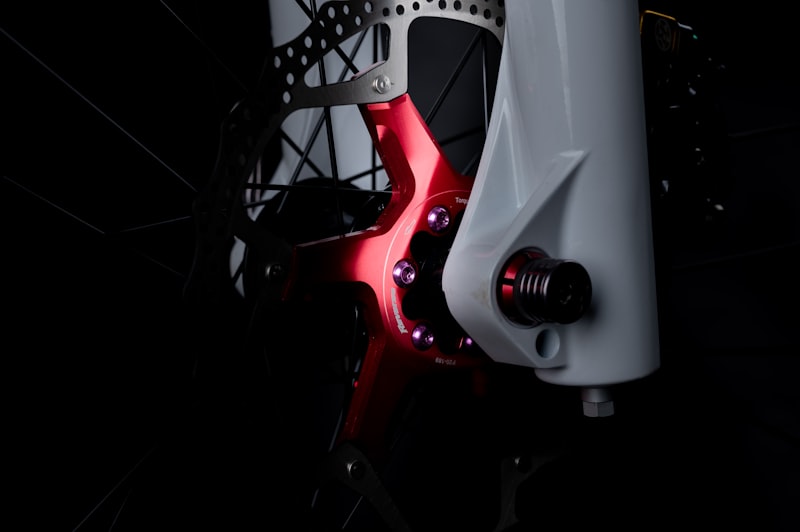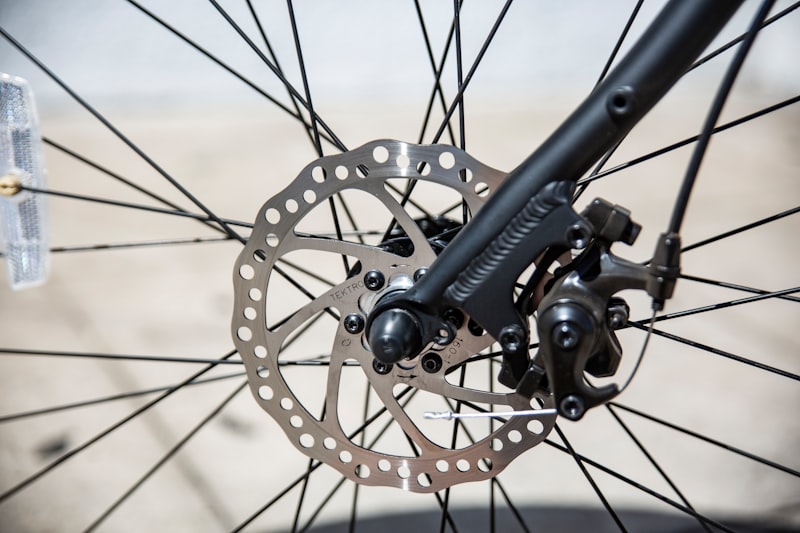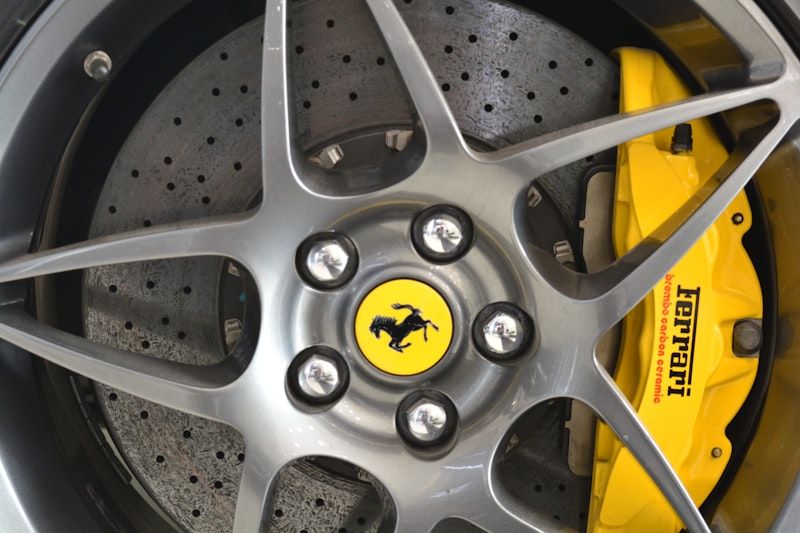Are you curious to know the difference between ABS and disc brakes? Well, let’s dive right in and explore these two crucial components of modern braking systems.
Imagine you’re cruising down the road, and suddenly you need to stop your car in a split second. That’s when your brakes come into play, ensuring your safety. Both ABS and disc brakes play essential roles in stopping your vehicle effectively, but they have distinct characteristics.
Let’s start with disc brakes. Picture a shiny metal rotor attached to your wheel, surrounded by a caliper. When you press the brake pedal, hydraulic fluid is sent to the caliper, which then squeezes the brake pads against the rotor. This action creates friction, slowing down or bringing your vehicle to a halt. Disc brakes are known for their excellent stopping power, especially in high-performance vehicles. They dissipate heat efficiently, preventing brake fade during prolonged use.
On the other hand, ABS, or Anti-lock Braking System, takes braking to the next level. It’s a sophisticated technology designed to prevent your wheels from locking up during sudden stops. How does it work? Well, imagine you’re driving on a slippery surface, and you slam on the brakes. Without ABS, your wheels could lock up, causing you to lose control. But with ABS, sensors constantly monitor the rotational speed of each wheel. If one or more wheels are about to lock up, the system rapidly modulates the brake pressure, allowing you to maintain steering control while coming to a stop. This pulsating sensation you might feel in the brake pedal is ABS in action, keeping you safe on the road.
To sum it up, disc brakes provide powerful and reliable stopping force, while ABS ensures that your wheels don’t lock up, enabling you to maintain control of your vehicle. Think of it this way: disc brakes are like the strong arms that bring your car to a halt, while ABS acts as an intelligent guardian, preventing your wheels from slipping and sliding.
So, next time you hit the brakes, remember the difference between these two essential components. Disc brakes deliver stopping power, and ABS keeps you in control, ultimately enhancing your safety on the road. Stay informed and stay safe!
Breaking It Down: Unveiling the Key Distinctions Between ABS and Disc Brakes
Are you ready to delve into the world of brakes? Today, we’re breaking it down and unveiling the key distinctions between ABS and disc brakes. Buckle up and get ready to explore these important components of your vehicle’s braking system!
Let’s start with ABS, which stands for Anti-lock Braking System. This cutting-edge technology has revolutionized the way we brake. Imagine driving on a wet or slippery road when suddenly, you need to make an emergency stop. ABS comes to the rescue by preventing your wheels from locking up, allowing you to maintain control and steer clear of danger. It achieves this by rapidly pulsing the brakes, applying and releasing pressure multiple times per second. With ABS, you can stop quickly and effectively while still having the ability to maneuver.
On the other hand, we have disc brakes. Picture a bicycle wheel with a metal disc attached to it. That’s essentially what a disc brake looks like, but on a larger scale. Disc brakes are composed of a rotor, caliper, and brake pads. When you press the brake pedal, hydraulic pressure is applied to the caliper, causing the brake pads to squeeze against the rotor. This frictional force slows down the rotation of the wheel, eventually bringing your vehicle to a halt. Disc brakes are known for their excellent stopping power and heat dissipation capabilities, making them a popular choice in high-performance vehicles.
Now that we’ve revealed the basics of ABS and disc brakes, let’s compare them. While ABS is a safety feature that prevents wheel lock-up and allows for better steering control during emergencies, disc brakes are the physical mechanisms responsible for slowing down and stopping the vehicle. In simpler terms, ABS is an intelligent system that works together with the disc brakes to enhance safety and control on the road.
Both ABS and disc brakes play essential roles in ensuring your safety while driving. ABS keeps your wheels from locking up, while disc brakes physically slow down and stop your vehicle. Together, they provide a reliable and efficient braking system that you can trust. So next time you hit the road, remember the key distinctions between ABS and disc brakes, and drive with confidence!
Revolutionizing Stopping Power: Understanding the Evolution of ABS and Disc Brake Technologies
Have you ever wondered how modern cars manage to stop quickly and efficiently, even in emergency situations? The answer lies in the evolution of two groundbreaking technologies: ABS (Anti-lock Braking System) and disc brakes. These innovations have completely revolutionized stopping power, making driving safer and more reliable than ever before.
Let’s start by delving into the world of ABS. Imagine you’re driving down a slippery road when suddenly, a deer darts across your path. In such a panic-inducing moment, your instinct is to slam on the brakes, but without ABS, this action could lead to disaster. ABS, however, ensures that disaster is averted. By rapidly pulsating the brakes, ABS prevents the wheels from locking up, allowing you to maintain control of the vehicle while coming to a stop. This technology not only reduces the risk of skidding and losing control, but it also shortens the braking distance, giving you more time to react and avoid accidents.
Now, let’s shift our focus to disc brakes. These marvels of engineering have replaced the traditional drum brakes in most vehicles due to their superior performance. Picture a bicycle wheel with a metal disc attached to it. When you apply the brake pedal, a pair of brake pads squeeze against this disc, creating friction that slows down the rotation of the wheel. This design offers several advantages over drum brakes. First and foremost, disc brakes dissipate heat more effectively, preventing brake fade even during prolonged heavy braking. Additionally, they provide consistent and responsive braking performance, enabling precise control over the deceleration process. With disc brakes, you can count on reliable stopping power in various driving conditions.
The combination of ABS and disc brakes has transformed the way we stop our vehicles. From enhancing safety to improving overall handling, these technologies have undoubtedly made a significant impact on the automotive industry. Whether you’re navigating treacherous road conditions or facing an unexpected obstacle, ABS and disc brakes work together seamlessly to ensure your safety and peace of mind.

As technology continues to advance, we can only anticipate further improvements in braking systems. However, for now, we can appreciate the remarkable evolution that has taken place, revolutionizing stopping power and making our journeys on the road safer than ever before.
From Friction to Precision: Exploring How ABS and Disc Brakes Differ in Mechanism and Operation
Are you tired of trying to understand the differences between ABS and disc brakes? Well, fret no more! In this article, we will take a deep dive into the mechanisms and operations of these two braking systems. Prepare to be amazed as we unravel the secrets behind their functions.
Let’s start with ABS, which stands for Anti-lock Braking System. Imagine driving on a slippery road, and suddenly you need to slam on the brakes. Without ABS, your wheels might lock up, causing your vehicle to skid uncontrollably. However, ABS comes to the rescue by preventing wheel lock-up. How does it do that? Well, it utilizes sensors to detect when a wheel is about to lock up, and then it modulates the brake pressure to that wheel, allowing it to keep rotating while still slowing down the vehicle effectively. It’s like having a superhero guardian angel controlling your brakes!

On the other hand, disc brakes operate in a slightly different manner. These brakes consist of a brake caliper, brake pads, and a rotor. When you press the brake pedal, hydraulic pressure is applied to the caliper, causing the brake pads to squeeze against the rotor, creating friction. This friction slows down the rotation of the rotor, which in turn reduces the speed of the vehicle. It’s like a well-choreographed dance between the brake components, ensuring precise control over your stopping power.
So, what sets ABS and disc brakes apart? While ABS focuses on preventing wheel lock-up, disc brakes solely concentrate on converting kinetic energy into heat through friction, ultimately stopping the vehicle. ABS can be considered an enhancement to the overall braking system, providing additional safety measures during emergency stops and slippery conditions.
ABS and disc brakes differ in terms of mechanism and operation. ABS prevents wheel lock-up by modulating brake pressure, while disc brakes use friction to slow down the vehicle. Together, they ensure safer and more precise braking experiences. Now that you understand the fascinating dissimilarities between these two braking systems, you can hit the road with confidence and peace of mind! Drive safely!
Braking Battlefield: Which Reigns Supreme – ABS or Disc Brakes?

When it comes to ensuring safety on the roads, there’s one essential component that plays a critical role: the braking system. Within this realm, two key contenders often spark a debate among motorists – ABS (Anti-Lock Braking System) and disc brakes. So, which of these braking technologies reign supreme? Let’s delve into the details and find out.
ABS, short for Anti-Lock Braking System, is a safety feature designed to prevent wheels from locking up during sudden braking. By employing sensors, it detects when a wheel is about to lock and rapidly modulates brake pressure, enabling the driver to maintain steering control. This technology has revolutionized the automotive industry by significantly reducing the risk of accidents caused by skidding.
On the other hand, we have disc brakes, which have been around for quite some time and are widely used in modern vehicles. Disc brakes consist of a rotor, caliper, and brake pads. When the brake pedal is pressed, the caliper clamps down on the rotor, generating friction and slowing down the vehicle. This design offers excellent stopping power and consistent performance, making it a popular choice for many drivers.
So, the big question is: which one should you choose? Well, it depends on various factors. If safety is your top priority, ABS takes the lead. Its ability to prevent wheel lock-up in emergency situations can be a lifesaver. However, it’s important to note that ABS works in tandem with the braking system as a whole, including the type of brakes installed.
Disc brakes, while not specifically designed to prevent wheel lock-up, still offer exceptional stopping power and durability. Their solid and reliable performance has made them a staple in the automotive industry. When combined with ABS, disc brakes provide an even higher level of safety and control.
In the end, whether ABS or disc brakes reign supreme depends on your specific needs and preferences. If you prioritize safety and want an extra layer of protection, ABS is a must-have. On the other hand, if you value reliable performance and responsive braking, disc brakes will serve you well. Ultimately, both technologies have their strengths and contribute to safer road journeys.
So, which team are you on? The safety-centric ABS or the powerful and dependable disc brakes? The choice is yours to make based on what matters most to you and your driving experience.
